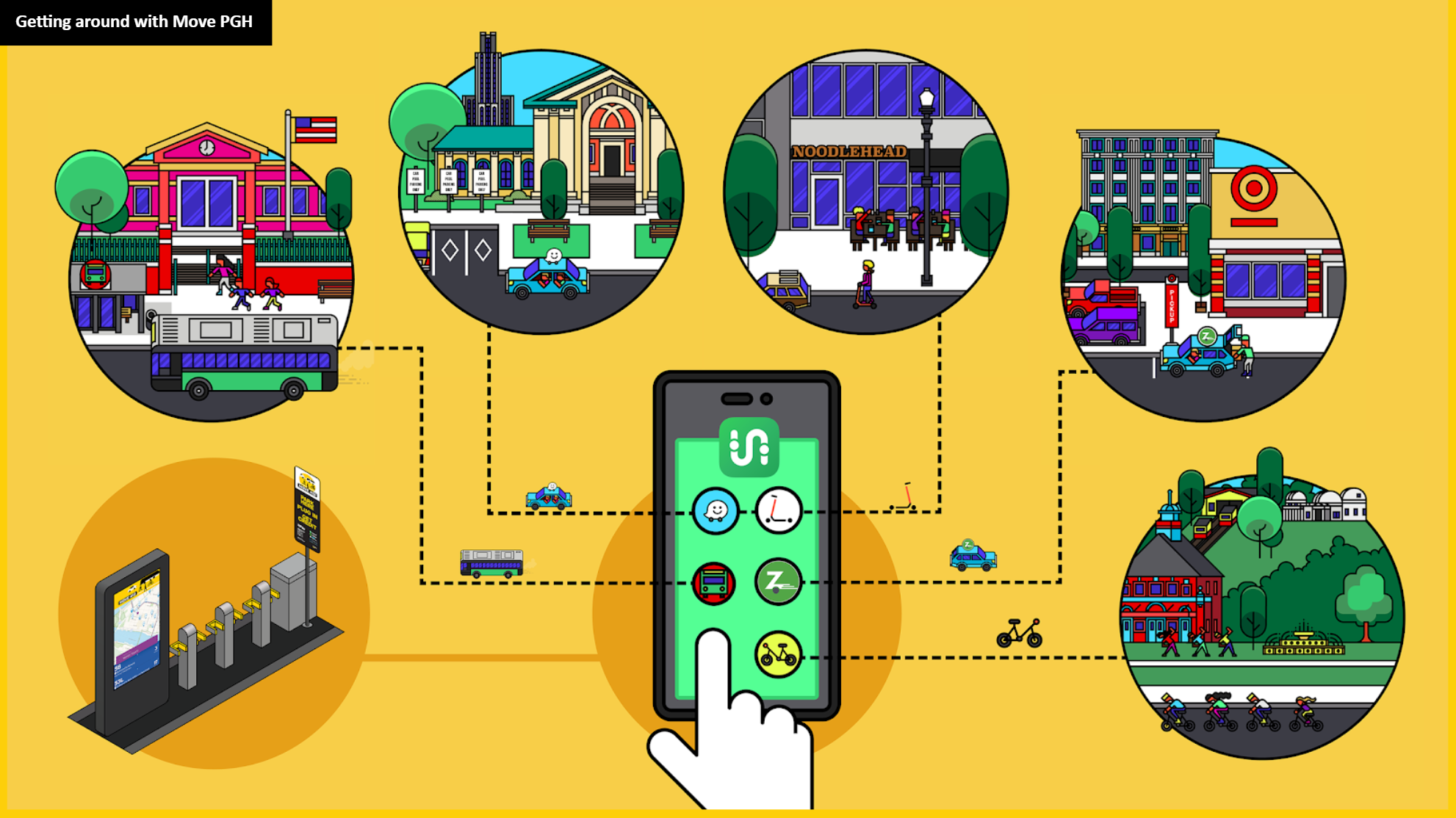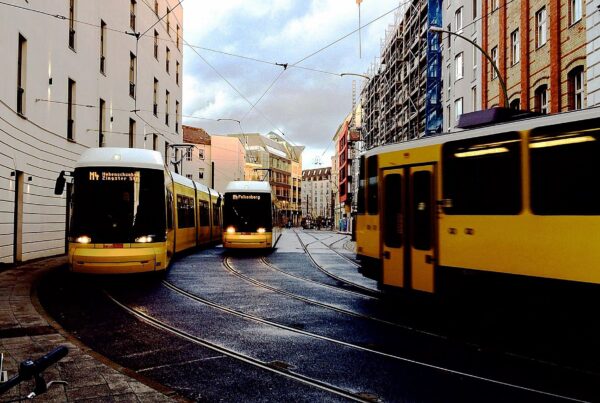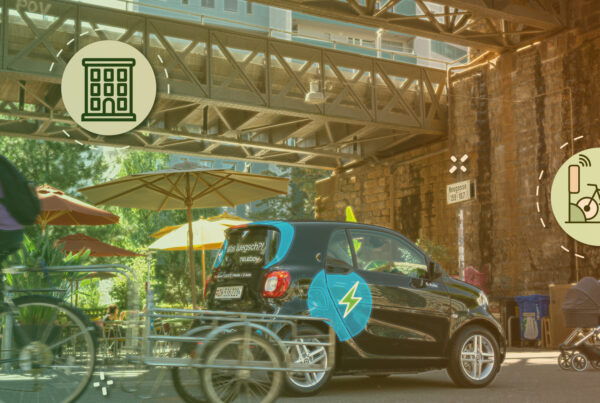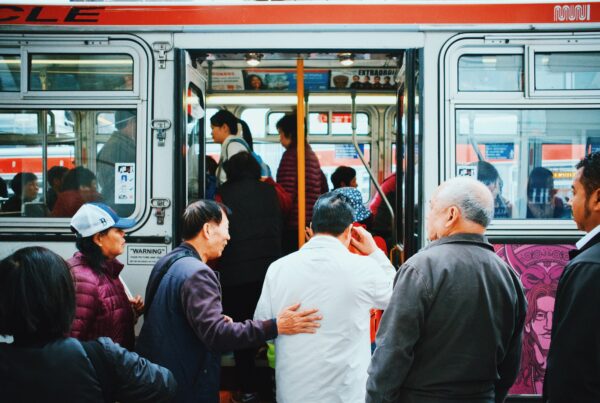The Mobility Hub
Your weekly guide to the latest in shared mobility
SUMC News and Announcements
Hi friends,
This week, we’re diving right in!
Shifting the Mobility Paradigm with Move PGH in Pittsburgh, PA
“What we are trying to demonstrate is that multimodal systems are better together…these things are not in competition. What we are in competition with is a built form and a mobility system that relies on private ownership and private operations, principally automobiles, if you really want to access all the opportunities available in the region.”
Credit: City of Pittsburgh
Move PGH is the most extensive Mobility as a Service (MaaS) project of its kind in the United States. Hosted through Pittsburgh’s Department of Mobility and Infrastructure (DOMI), it aspires to make shared mobility more convenient, accessible, and equitable by offering users an array of transportation options in one app, Transit, and at centrally located Mobility Hubs. Alongside this, DOMI is developing a Guaranteed Basic Mobility program that offers fare-free shared mobility options to low-income residents.
The SUMC Mobility Learning Center has a new in-depth case study on this project. It includes considerations for designing programs with MaaS and/or mobility hubs and an interview with Karina Ricks—who oversaw the implementation of Move PGH.
New on the SUMC Blog
Via Transportation shares their thoughts on 3 ways cities can build more accessible transportation for people with disabilities in this guest blog post.

Mobility Justice
The COVID-19 pandemic exposed the inequities in transportation spending, revealing that the most used public transit systems (buses) receive less than 8% of transportation dollars nationally and that resources were often not spent on the people who need it most. This left cities to reallocate resources and do their best to catch up.
We lost many places to highways, but one national park is celebrating its 50th anniversary of being saved from the same fate after a Supreme Court Justice organized a 200-mile protest hike along the Chesapeake & Ohio Canal in Washington, showing the necessity for nature preservation.
1,200 lives were lost in Oregon, Washington, and British Columbia—disproportionately Black, Brown, and low-income folks. The culprit? Human-caused climate change fueled by our reliance on cars. Investing in public transit keeps communities safe while creating more new jobs.

Ridehailing/Carsharing/Carpooling
The medallion program failed taxi drivers in New York City, leaving many with crushing debt and pushing them to hunger strike. While the mayor proposed a debt relief package, the New York Taxi Workers Alliance calls it a “drop in the bucket” and seeks better measures to help drivers.
Moves, a fintech startup, wants to put the power in gig workers hands, starting with rewarding them with stocks from the companies they drive for, granting company share and possible future influence over corporate decisions.
Kenyan Uber riders have a new shared ride option with Pool Chance, a similar service to the suspended Uber Pool in North America, where riders can potentially get a discount if other passengers are picked up. No word on sharing the service with the US.

Bikesharing & Micromobility
On the heels of making scooter sharing a permanent part of the City’s transportation repertoire, 6,000 new, shareable e-scooters are coming to Chicago next spring, and they’ll be allowed Downtown (just not on sidewalks.)
The try-it-before-you-buy-it model is invigorating potential cargo e-bike users through lending libraries where people can see for themselves how the bikes can easily replace cars for their mobility needs.
Startup Zoba wants to increase rides and profitability for micromobility companies with a platform that uses AI to help decide where vehicles should be positioned, how to incentivize users and how to optimize efficiency—and Zoba claims that companies are seeing ridership boosts of 20-50%.

Transit
The Champaign-Urbana Mass Transit District will be swapping smog for vapor for its bus fleet now that the agency has unveiled a new hydrogen production station (powered by a solar array including 5,500 panels) that will be used to generate energy for new hydrogen fuel cell buses.
Because of the recent train car derailment that occurred last Tuesday, caused by a flaw with wheels moving along the axle, DC Metro has taken all similar 7000-series cars made by Kawasaki Rail Car Inc. off the system for the time being and urges other transit agencies to investigate as well.
Ohio-based healthcare provider MetroHealth System knows that transit riders get more exercise daily than those driving to work so it’s expanding a program where 150 employees are eligible for a free monthly Greater Cleveland RTA transit pass for a year’s time.

Technology
Students from the Eindhoven University of Technology worked together to build a solar-powered electric camper van (which is currently on a 1,800-mile road trip across Europe) that includes household amenities like a kitchen, bed, shower—and it can hit 450 miles a day with the sun shining bright.
People with visual impairments in Connecticut may be able to navigate public transportation more easily with a new program that uses Aira’s video-streaming technology to connect to a remote agent (through users’ smartphones) for live visual information and narration.
Meet the Racine Badger: a new autonomous electric shuttle navigating Gateway Technical College’s lakefront campus in Racine, WI to test zero-emissions, driverless tech. The project is the brainchild of the City of Racine and Perrone Robotics.

Sustainability
Electric vehicles are set to usher in a new wave of clean transportation use in the US, but is the grid ready for it? The Washington Post doesn’t think so—yet. That will take renewable energy buildout, comprehensive infrastructure upgrades, and significant, quickly implemented, investment for a stable, EV-ready system.
A new report from the Regional Plan Association lays out how New York City can transform local mobility, public space allocation, climate resiliency for better livability, sustainability, and safety—once you remove the wealth of free public space dedicated solely to private vehicle parking.
The International Transport Forum’s latest study, Integrating Public Transport into Mobility as a Service, takes a lens to the MaaS market in Europe and recommends light and flexible regulatory frameworks that support easily-integrated mobility policies and common data-sharing standards to ensure the best outcome of shared mobility adoption.
Project Funding Opportunities
RFP: Shared Bike and Scooter Program
City of Minneapolis
Minneapolis, MN
Deadline: October 27
RFP: Micro Transit Program
Greater Cleveland Regional Transit Authority
Cleveland, OH
Responses Due: October 29
RFP: Shared Mobility for Rancho San Pedro Pilot
Los Angeles Clean Tech Incubator
Los Angeles, CA
Deadline: October 29
RFP: Regional Coordination – a Technological Solution to Coordinating Regional Transportation, Creating Efficiency in Service
Delaware Dubuque Jackson County Regional Transit Authority (RTA 8), IA
Deadline: October 29




